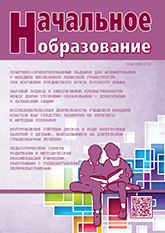Moskva, Moscow, Russian Federation
The article is devoted to the development by readers of primary school age of the emotional sphere of a work of art, through which one of the key modern competencies is formed - emotional intelligence. The author describes the possibilities of developing emotional intelligence in junior schoolchildren in the course of studying the subject "Literary reading", which is carried out on the basis of their acquaintance with the psychology of children's fiction. Psychologism is considered as an element of the artistic form of a work, with the help of which its meaning and ideological and emotional content are expressed. The methods of using psychologism in the literary and artistic text are characterized and, taking this into account, the methodological approaches to the development of full-fledged textual activity of primary schoolchildren are considered.
primary school reader; lessons of literary reading in primary school; emotional sphere; psychologism; fiction for children; cognitive and aesthetic potential; the formation of emotional intelligence; textual activity; reading competence of primary school students
1. Esin A.B. Psihologizm russkoj klassicheskoj literatury [Psychologism of Russian classical literature]. Moscow: Flinta Publ., 2017. 176 p.
2. Metodika obuchenija russkomu jazyku i literaturnomu chteniju: uchebnik i praktikum dlja akademicheskogo bakalavriata. Serija: «58. Bakalavr. Akademicheskij kurs» [Methods of teaching the Russian language and literary reading: textbook and workshop for academic bachelor's degree. Series: "58. Bachelor. Academic course»]. Moscow: Jurajt Publ., 2017. 468 p.
3. Nikiforova O.I. Psihologija vosprijatija hudozhestvennoj literatury [Psychology of perception of fiction]. Moscow: Kniga Publ., 1972. 152 p.
4. Sil'chenkova L.S. Metodika obuchenija mladshih shkol'nikov chteniju krupnoob#emnyh proizvedenij. Kand. Diss [Methodology for teaching primary schoolchildren to read large-volume works. Cand. Diss]. Moscow: Moskovskij pedagogicheskij gosudarstvennyj universitet Publ., 1988. 16 p. EDN: https://elibrary.ru/XGINDV
5. Sil'chenkova L.S. Nauchnye osnovy analiza hudozhestvennogo teksta v nachal'noj shkole [Scientific bases of the analysis of literary text in elementary school]. Sb. nauchnyh trudov po materialam VII Vserossijskoj nauchno-prakticheskoj konferencii «Filologicheskaja nauka i shkola: dialog i sotrudnichestvo» [Sat. scientific papers based on the materials of the VII All-Russian Scientific and Practical Conference "Philological Science and School: Dialogue and Cooperation"]. Moscow: Moskovskij institut otkrytogo obrazovanija Publ., 2015, pp. 213-221. EDN: https://elibrary.ru/UWIVDP
6. Sil'chenkova L.S. Nauchnye osnovy slovarno-leksicheskoj raboty v nachal'noj shkole [Scientific foundations of vocabulary and lexical work in elementary school]. Sb. nauchnyh trudov, posvjashhennyj 95-letiju so dnja rozhdenija akademika RAO N.M. Shanskogo «Sovremennoe russkoe jazykoznanie i lingvodidaktika» [Sat. scientific works dedicated to the 95th anniversary of the birth of Academician of the Russian Academy of Education N.M. Shanskiy "Contemporary Russian Linguistics and Linguodidactics"]. Moscow: Moskovskij finansovo-juridicheskij universitet Publ., 2018, pp. 438-452. EDN: https://elibrary.ru/XRIPPF
7. Jemocional'nyj intellekt kak faktor formirovanija u uchashhihsja kljuchevyh kompetencij [Emotional intelligence as a factor in the formation of key competencies in students]. Sb. nauchnyh trudov po materialam Mezhdunarodnoj nauchno-prakticheskoj konferencii «Obrazovatel'noe prostranstvo v informacionnuju jepohu» [Sat. scientific papers based on the materials of the International Scientific and Practical Conference "Educational Space in the Information Age"]. Moscow: Institut strategii razvitija obrazovanija Publ., 2019, pp. 1122-1133.






